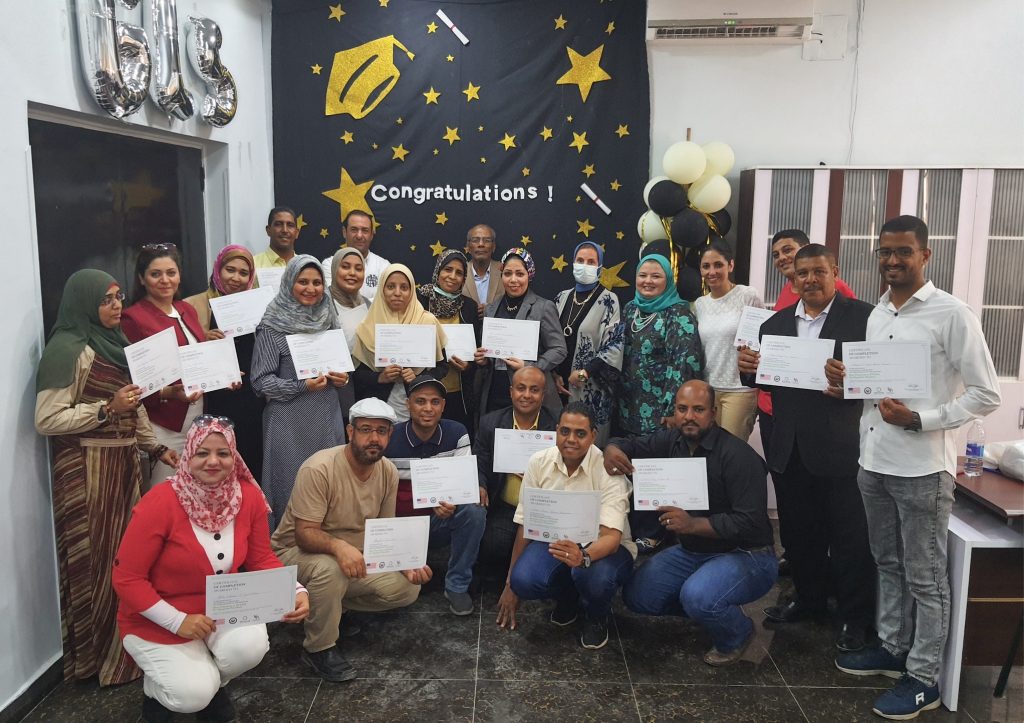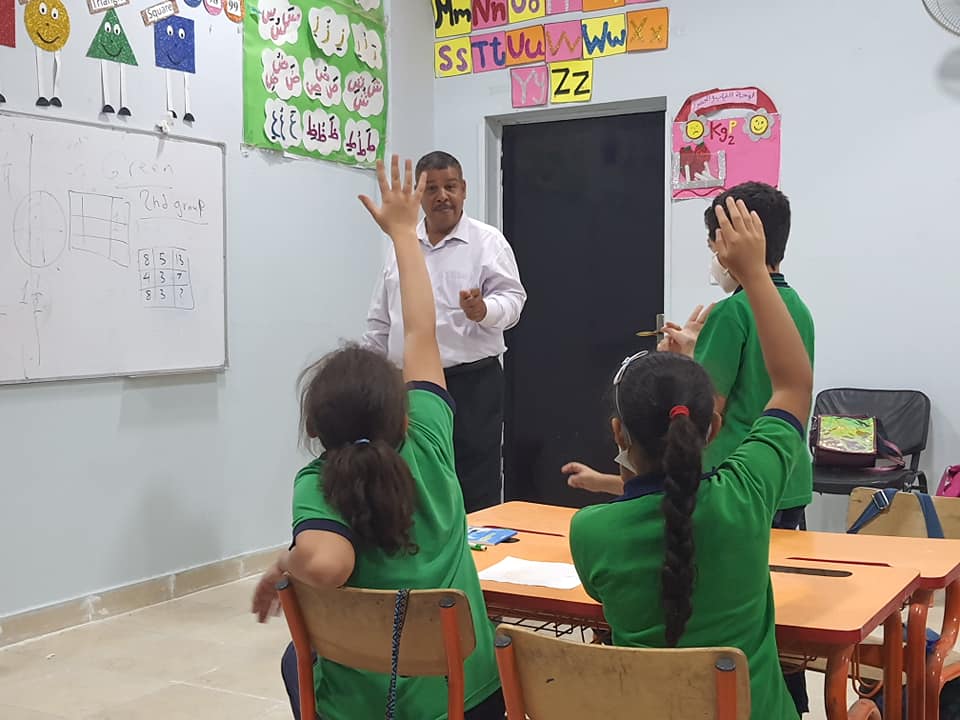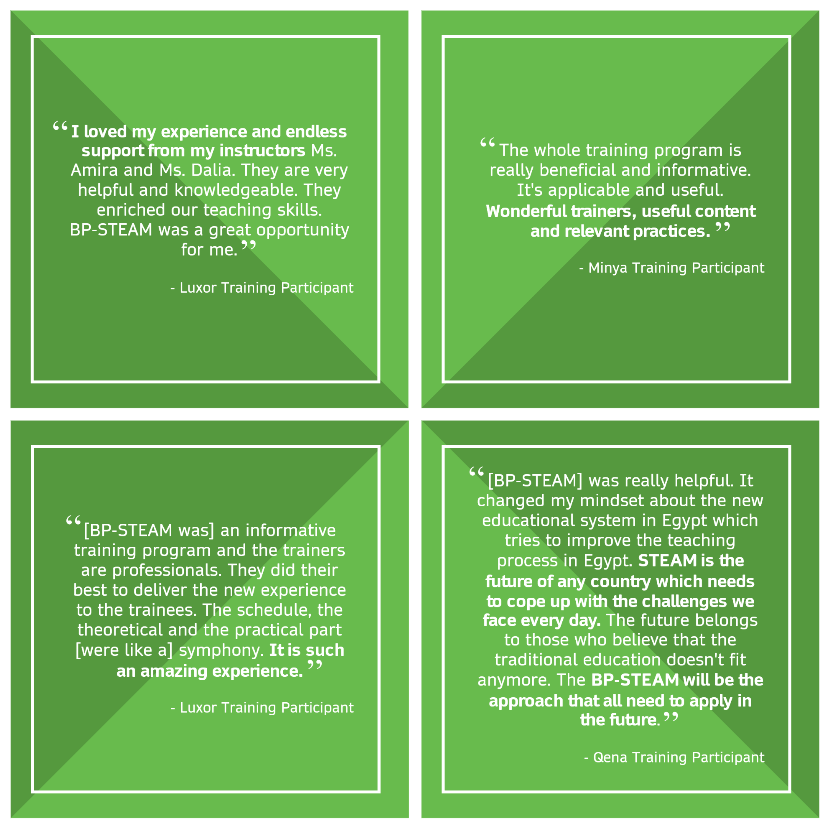-
What We Do
- WHERE WE WORK
-
About Us
 Welcome Message from Carol Jenkins
Welcome Message from Carol JenkinsFor more than 90 years, World Learning has equipped individuals and institutions to address the world’s most pressing problems. We believe that, working together with our partners, we can change this world for the better.
On my travels, I’ve had the opportunity to meet with many of those who have joined us in this mission. In Baghdad, we’ve trained more than 2,300 Iraqi youth who are already giving back at home. In London, our partners in the TAAP Initiative strongly believe that we are all responsible to practice inclusion. And in Vermont, our Experiment in International Living and School for International Training participants prove every day that they have the tools and the determination to change the world.
Please join us in our pursuit of a more peaceful and just world.
- Get Involved
Media Center > Story
STEAM Training Addresses Key Challenges for Teachers in Egypt
November 8, 2021

This summer, the Best Practices in STEAM (Science, Technology, Engineering, Arts, and Mathematics) for Egyptian Teachers program, or BP-STEAM, trained 67 teachers in Upper Egypt on a wide range of essential pedagogical skills and strategies. Sponsored by the U.S. Embassy in Cairo, BP-STEAM’s ultimate goal is to prepare students to become skilled problem-solvers, readying them for the workforce and thereby supporting Egypt’s Vision 2030.
BP-STEAM is a five-day long, seven-hour per day intensive training course that covers a wide range of critical pedagogical topics. These topics included lesson planning, Universal Design for Learning, learner-centered teaching, experiential learning, reflective practice, inductive learning, recycling of information, and asking for and responding to feedback.
Three iterations were conducted in the Luxor, Minya, and Qena governorates during July and August, serving 67 teachers total. “The whole training program is really beneficial and informative,” said a participant from the Minya training. “Wonderful trainers, useful content and relevant practices.”

Experiential learning is a key component of all World Learning programs. In BP-STEAM, this meant that not only were participants actively engaged and practicing their newly learned skills during the training, but they also had the opportunity to put their learning to the test with eight hours of practicum with real students from the hosting schools.
“I loved my experience and endless support from my instructors, Ms. Amira and Ms. Dalia,” said a program participant from the Luxor training. “They are very helpful and knowledgeable. They enriched our teaching skills. BP-STEAM was a great opportunity for me.”
The program practiced what it taught, with an uncompromising commitment to fostering a learner-centered, supportive, and reflective educational experience. That commitment paid off, with 100 percent of alumni surveyed reporting that they would recommend BP-STEAM to a colleague.
After the three iterations completed, over thirty alumni joined four American STEM teachers for a Virtual Exchange Forum to reflect on learning, share advice, and connect over their passion for STEAM education. Moderated by Dr. Katey Shirey, the Forum discussed innovative teaching strategies used by American teachers before opening to multiple breakout discussions on the skills developed during BP-STEAM. The American STEM teachers also joined the BP-STEAM participants’ group on Facebook, connecting them further after the webinar ended.
The program has already been passed on from participants to their colleagues. World Learning received several reports of alumni organizing informal workshops to share their new knowledge with their fellow teachers at their schools. One participant even created a video on Universal Design for Learning based on what he learned in the course.
“[BP-STEAM] was really helpful. It changed my mindset about the new educational system in Egypt,” said a participant from the Qena training. “STEAM is the future of any country which needs to cope with the challenges we face every day. The future belongs to those who believe that traditional education doesn’t fit anymore. The BP-STEAM [approach] will be the approach that all need to apply in the future.”






